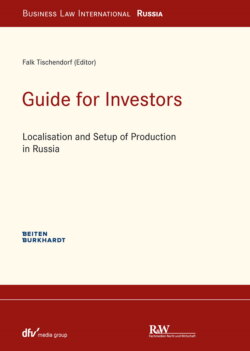Читать книгу Guide for Investors - Falk Tischendorf - Страница 10
На сайте Литреса книга снята с продажи.
4. Localisation in everyday practice
ОглавлениеThe main problem for the automotive industry is that production is performed almost exclusively for the limited and very fickle Russian market.
For example, this market has shown to have an annual potential of more than three million vehicles, a target that was reached in 2008 and 2012. However, in 2013 the market contracted significantly, and only began to grow again in the second quarter of 2017. Ultimately, growth in 2017 equaled 12 % and 2018 13 %. However, pursuant to the latest statistics, in 2019 the Russian market has declined by 2 % with showing total sales of 1,75 Mio. cars and LCV.
The very limited total sales and production volume is highly segmented. The resulting low volume for each individual platform and car model is setting the boundaries for the successful establishment of vertical localisation. This represents the main obstacle to the further development of production and attainment of the localisation goals set forth in Resolutions No. 166 and No. 566.
Source: Association of European Businesses (AEB), statistics of the Automobile Manufacturers’ Association, annual retail turnover in the Russian Federation, passenger cars and light commercial vehicles, 2001–2019.
For the time being the search for local sub-suppliers remains problematic in all regions, and the localisation of international suppliers is often impossible due to the low overall production volumes. Even reliable supplies from local manufacturers have often encountered difficulties in terms of both volume and quality.
In the manufacturing and processing industry, which is very important for the automotive industry, there are still only a few small and medium-sized specialized enterprises. And those that exist take the form of a trading enterprise with a relatively low level of attached production. However, trading is still the key aspect.
Small businesses consider production to be a fairly risky process owing to its longevity, capital intensity, transparency and the need to be tied down to one place. For this reason, local companies do not exploit market niches in the volume that you might expect. If you do manage to find a local supplier, the financial and legal structures of its company may rapidly become a risk from a compliance angle. Dubious ownership structures, labyrinthine management structures and frequent changes to the corporate name may, for example, deliver tax benefits, but run counter to long-term investments and significant supply volumes, which is a key criterion for serial suppliers in the automotive business.
The crises and sanctions since 2014 have affected small private businesses the most. In addition to the more than 50 % drop in demand, and against the backdrop of sanctions, they find it virtually impossible to obtain bank loans at acceptable rates. This fact has definitely brought a certain number of investments to a halt. By contrast, it is highly likely that big enterprises can count on state finance and support.
To achieve reliable in-depth localisation with the assistance of local companies, close ties and guidance by an international partner can be a definite advantage.
Staffing issues look far better. In this respect, you have more opportunities than risks in Russia. In theory, significant know-how has been transferred to the country. A number of specialists boast a good education and many years of experience in different specialist areas. It is possible to receive training in professional, technical and communications skills from local and international companies in both Russian and English.
Today Russia has lots of managers, who received good training at the start of the 2000s and today no longer fit the stereotype of “command-and-control socialist workers”. Regardless of whether this picture actually complied with reality at some point in time, such negative connotations frequently still exist even to this day.
The contemporary generation of Russian managers is more often than not aged between 30–40. Furthermore, individuals who gained experience at international companies and abroad are the majority here. In many instances they also studied abroad. This generation knows the culture, opportunities and limitations, and also Russian and foreign companies and their management.
In connection with the need for savings due to the crisis, international companies entrust the management of their Russian companies primarily to local employees. In practice, this trend is to large extent having a positive impact. These managers are very pragmatic and goal-oriented, and are well acquainted with Russian conditions. Consequently, less time is needed on planning and reaction.
Nevertheless, it is worth noting here that a frequent change of employer in Russia is often considered the rule, and therefore continuity and uniformity may suffer.
Systematic training and the intentional involvement of Russian managers in setting strategic objectives and the decision-making process is a factor capable of generating loyalty and the readiness of local service providers to cooperate. This principle tends not to be considered adequately enough. This relates in particular to companies with the so-called tradition of hiring expats.
